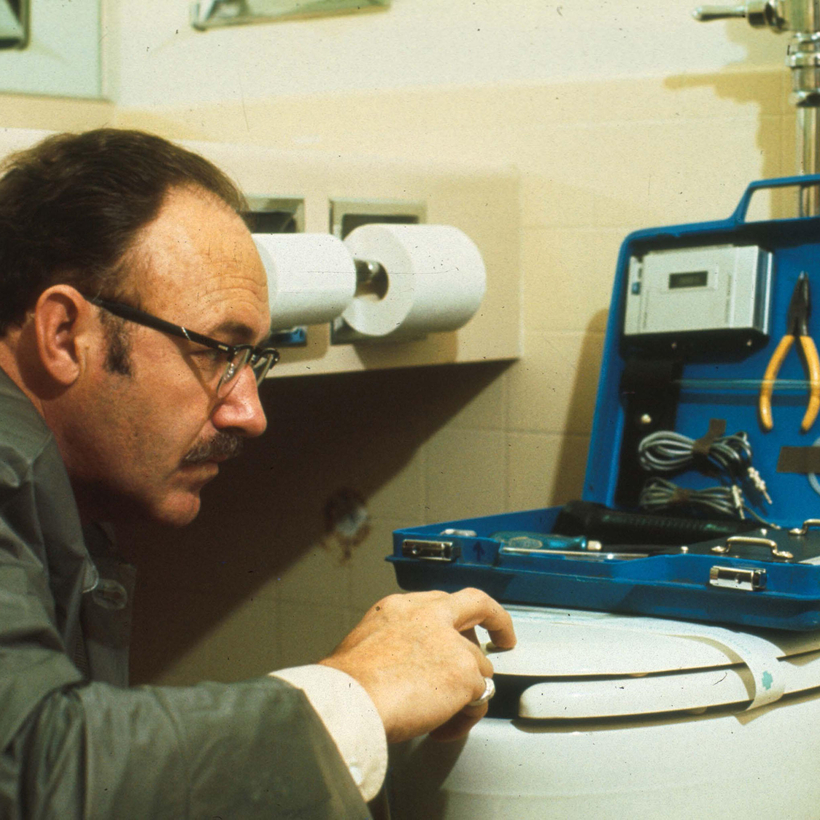Forty-eight years after winning the top prize at Cannes for The Conversation, the uncanny thriller linking our surveillance culture to corporate dirty tricks, Francis Ford Coppola has supervised a new 35-mm. print of the film that premiered at New York’s Film Forum and is rolling out across the country, opening in L.A. on January 28 and in San Francisco on February 4.
This groundbreaking movie looks and feels fresher than ever. Coppola and his star, Gene Hackman, imbue technical genius Harry Caul with contradictions and hypocrisies that epitomize America’s split personality even more now than during Watergate. A driven professional and devout Catholic, Caul routinely breaches other people’s privacy and can’t control his growing obsession with one of his current targets, an apparent innocent named Ann (Cindy Williams).

Walter Murch, the film’s “co-creator” (to quote Coppola biographer Peter Cowie), speaking by phone from his home in Bolinas, California, recalls that The Conversation “was super-topical at the time because it came out right in the middle of Watergate. But it was seen to be dramatizing a problem at the top of the pyramid—the president and the president’s men and what they were doing. It didn’t feel to people generally that they were going to be spied on, although that’s what the film implies. But clearly what’s happened over the last 20 to 25 years is the spread of the Internet, and now I’m talking to you on a phone that could be recording all of our conversation right now and sending it to somebody without our knowledge.”
Murch, at 78 the doyen of film editors and sound designers, received his first Oscar for Apocalypse Now (sound) and his second and third for Anthony Minghella’s The English Patient (sound and editing). He’s currently at work on the follow-up to In the Blink of an Eye (1992; revised 2001), a classic treatise on editing. Suddenly Something Clicked, due out from Faber and Faber in 2023, will cover both editing and sound, with chapters on writing, cinematography, and directing, “based on voyages to the film-planets I have visited, and the storms I have (thus far) survived.”
In 1972, when production began on The Conversation, Murch was the in-house sound wizard for the Coppola–George Lucas production company, American Zoetrope. (Coppola coined the credit “sound designer” for Murch.) With The Conversation, Murch took charge of picture editing for the first time, mixing American Graffiti for Lucas by day and watching dailies for Coppola at night.

He became the resident seer for an eerily prescient movie, forging efficient and poetic connections in an emerging digital universe where we can’t trust anyone, including ourselves. Murch helped turn the film’s antihero into an archetypal figure, presaging the dangerous super-nerds of decades to come. Like Mark Zuckerberg, Harry Caul thinks he’s a neutral agent simply delivering data. Caul says, “I don’t care what they’re talking about. All I want is a nice, fat recording.” Murch remarks, “If you substituted ‘profit’ or ‘check’ for the word ‘recording,’ that’s Zuckerberg’s opinion.”
Murch had been a key part of Zoetrope’s brain trust from the beginning. But making the leap into editing on The Conversation was not easy. After suspending production to switch cinematographers (from Haskell Wexler to Bill Butler) and to relieve, in Murch’s words, “an agonized mood” on the set, Coppola ran out of time and money. Murch says, “He stopped shooting with 78 scenes yet to film out of almost 400: a fifth of the film.” As Coppola departed to ramp up The Godfather: Part II, he told Murch, “Cut it together the best way you can, and we’ll see where the remaining holes are and how serious they are. And then we’ll ask for permission from Paramount to shoot another couple of days or something.”
Murch helped turn the film’s antihero into an archetypal figure, presaging the dangerous super-nerds of decades to come. Like Mark Zuckerberg, Harry Caul thinks he’s a neutral agent simply delivering data.
Necessity became the godfather of invention: Murch discovered that he could generate suspense and shock using one deceptively straightforward line. In the conversation that sets up the entire film, Mark, Ann’s presumed lover (played by Frederic Forrest), tells her, “He’d kill us if he had the chance … ” When Harry isolates the line in his sound lab, Forrest lightly stresses the word “kill.”
Coppola had recorded that statement as he filmed Forrest and Williams strolling through San Francisco’s bustling Union Square. But “in 1972,” Murch says, “lavalier radio microphones were not what they are today,” so Murch had to re-record the actors’ dialogue in a similar but quieter city square. On the fourth take, Forrest put the emphasis on “us”—“He’d kill us if he got the chance.” Murch remembers thinking, “Oops, he got it wrong.” But at three o’clock one morning, he realized that Forrest’s errant reading could spark Caul’s awful epiphany.

In the finished film, when Harry goes back to his tapes after witnessing, and misinterpreting, a murder, he hears Forrest say, “He’d kill us if he got the chance”—and a deadly conspiracy comes into focus. “Films like The Conversation and The Talented Mr. Ripley [which Murch also edited and mixed] are told exclusively from the point of view of the protagonist,” Murch explains. “We turn the audience into Stockholm-syndrome hostages in the sense that they’re trapped within Harry’s mind. So we hear that line the way he would want to hear it: he wants Ann and Mark to be victims of a bad person so he can save them. Once everything begins to unravel, we hear the line as it was all along.”
Murch flew his latest version of the film to New York, where Coppola was shooting The Godfather: Part II. The director liked what he saw and heard. Murch had succeeded at peeling onion-like layers of emotion and compulsion from a character who could have seemed hollow and bland. Murch also managed to suggest the audiovisual contours of a new era. After Harry records Ann and Mark in Union Square, to get at their voices he must strip away some street musicians’ old-timey, upbeat tunes. “That was impossible to do then, and it’s practically impossible now,” says Murch. “In 1972, I thought, Well, the only way that it’s even theoretically possible is through digital recording, which was just beginning to be experimented with.”
Coppola had filmed Caul handling an open metal box filled with electronic doodads. Murch chose to view it as a digital device that, if tuned just the right way, could isolate the dialogue. “I had to ask, ‘Well, what does digital sound sound like when it’s distorted?,’” Murch says. He used a synthesizer to conjure a “choppy, blocky” sound: “that ahk-ahk-uh-ahk quality.” In the years since, Murch’s calculation has been confirmed: “That is how digital sound sounds when it’s distorted.”

Murch compensated for the 78 missing scenes with the manipulation of that “kill us” line and the addition of one pickup shot. The production “built this little mini-set with Harry’s workbench and tape recorder in Los Angeles, on a studio soundstage where another film was shooting. We just said, ‘Can we build this in the corner of your set? And, by the way, can we borrow your camera when you’re not using it? And can we use some of your film?’ If we had kept the camera running at the end, and panned 180 degrees to the left, it would have revealed Roman Polanski and Jack Nicholson waiting to get their camera back because that other film was Chinatown.”
Murch had re-engineered a subplot about a party girl, Meredith (Elizabeth MacRae), who seduces Caul and spies on him. In the script she steals the plans for his microphones. In Murch’s version she snatches tapes that are central to the mystery. “We were able to do it by shooting that one [new] shot,” he says, “which is where Harry pulls the reel out and reveals that the tape is gone and the boxes are empty, then it’s implied that she stole those tapes.”
Another missing voice recording, in Taghi Amirani’s bristling documentary Coup 53, edited and co-written by Murch, has whipped up a typhoon of controversy: M.I.6 officer Norman Darbyshire’s taped confession of his critical role in orchestrating the 1953 overthrow of Mohammad Mosaddegh, Iran’s first democratically elected prime minister, the year after Mosaddegh nationalized the British-owned Anglo-Iranian Oil Company. The U.S. and the U.K. partnered on the coup, though only the U.S. has acknowledged it. In the film, Darbyshire implicates himself and the British government in not only masterminding the operation but also in bringing about the gruesome torture and assassination of Mosaddegh’s loyal police chief, Mahmoud Afshartous.

A documentary that moves with the visceral lucidity of a Costa-Gavras thriller, Coup 53 packed houses and garnered rave reviews at the 2019 Telluride and BFI London film festivals. But a post-festival debate about the film’s use of Darbyshire’s interview has scared away distributors. The documentary can be streamed at coup53.com, and Murch continues to proselytize for its wide release.
“If we had kept the camera running at the end, and panned 180 degrees to the left, it would have revealed Roman Polanski and Jack Nicholson waiting to get their camera back because that other film was Chinatown.”
Darbyshire gave his story to the team behind Granada Television’s acclaimed docuseries End of Empire (1985). Because no tape, film, or video could be found, Amirani had to re-create that talk from a transcript, with Ralph Fiennes playing Darbyshire. The makers of End of Empire: Iran insist that Darbyshire spoke to them on deep background and never sat for the camera. To Murch, “the main disagreement is over whether Darbyshire was on the record when the tape was made. My point is that if you are recorded, you are by definition on the record.” No one doubts the transcription’s accuracy, he says.
Coup 53 persuasively depicts the overthrow of Mosaddegh as the test case for regime change by coup—a prime Western tactic for controlling Third World countries in the Cold War era. Murch says the movie asks, “What are the long-term consequences of actions that seem advantageous at the time? I would also say: resist the urge to clear the table of all the chips. The urge to win bigger than you need to is what led to Watergate and Nixon’s collapse, as well as Bridgegate and Chris Christie’s collapse, among many others—the eternal cycle of hubris and nemesis. Leave other nations alone, with their own dignity.”
Michael Sragow has been a film critic for Rolling Stone, Salon, and Film Comment, among other publications, and is the author of Victor Fleming: An American Movie Master


